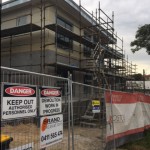DATA NEWS We love data!
Pressure building in apartment market
The headlines are all screaming that Australian banks might be having a problem with Chinese buyers using fraudulent income statements to take out mortgages on all those new apartments that are being built.
Westpac and its associated banking family was the first to go public, saying they are shutting down the window on these types of transactions, but now most banks and mortgage operators have come forward to say they are also being careful when it comes to foreign investment in the residential market.
The most interesting part of this story is that all the banks are saying it probably won’t be a problem and they are just being cautious as the real estate market cools down.
Last week’s preliminary auction clearance rate in Sydney was 72.6 per cent, lower than the 87.6 per cent last year, according to CoreLogic RP Data. Melbourne’s preliminary rate was also down at 71.2 per cent.
Westpac indicated that foreign portion of its loan book only represented 3 per cent of the total and was treated separately from the general mortgage account.
THE REAL PROBLEM
The real problem is no one knows the real numbers. As of a year ago up to 30 per cent of the Melbourne apartment market was thought to be Chinese money. It’s now down around 10 per cent. Victoria has helped the slowdown by imposing higher charges on foreign buyers and increasing fees on their rental returns. The Reserve Bank itself has directed banks curtail lending in the investor market.
However, the pain will come is when foreign buyers – and local investors – try to raise settlement finance on completion of a lot of apartments and find either they can’t raise the targeted amount because the banks loan book is full, or the banks have lowered residual valuations in line with a more cautious market.
 It’s then they must decide whether to go ahead with the transaction – and hope the market still delivers them a capital gain – or rent the property which they never intended to do, or simply dump the deposit.
It’s then they must decide whether to go ahead with the transaction – and hope the market still delivers them a capital gain – or rent the property which they never intended to do, or simply dump the deposit.
Whatever the case the banks do look to be in a comfortable place but why were they were lending money on a handshake and some phoney documentation from China?
As for the property developers, getting the deposit isn’t a bad outcome as long as they can sell the property again at a profit. That’s the key question. And as for the banks they would be more worried about their exposure to the residential construction industry than to single foreign investors.
AND MORE BAD NEWS
By next financial year, each state except for NSW will be in dwelling oversupply. That’s the conclusion of BIS-Shrapnel, which estimated that Melbourne will have 21,900 more dwellings than needed; West Australia will be over-supplied by 9000 homes and Queensland by 6400.
BIS in particular pointed to the dramatic increase in high-rise apartments, saying that dwelling commencements would peak nationally in the March quarter at record 221,000, with the big increase in high-rise apartments, and not traditional detached homes.
At the same time the key drivers of demand are in decline, BIS pointed out. Net overseas migration has halved from a high 300,000 in 2008-09 to an expected 150,000 this financial year while investor support was already down 12 per cent in the year to January
BIS which is well-known for its challenging calls on the industry said the downturn in high rise apartment construction would be significant with the apartment commencements in the Melbourne and Brisbane dropping up to 60 per cent, the forecaster predicts
BIS told the Financial Review that NSW – essentially Sydney – is still suffering from over a decade of under-building and there was little risk of oversupply before 2019-20.

